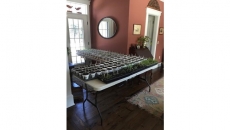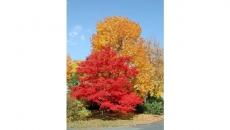I harvested my hardneck garlic crop earlier this month, which opened up some prime real estate in the garden, leaving me with an entire 4-by-4-foot raised bed to replant.
As I was settling Eight Ball squash seedlings into the space, it occurred to me that I was inadvertently practicing what is known as “succession planting,” a term that can apply to a few different strategies intended to extend the growing season.
One approach refers to planting a second garden in the space vacated by early-maturing crops, as I’d done in my garlic bed.
Another strategy involves sowing herb or vegetable seeds at regular intervals, rather than all at once, to ensure multiple or continued harvests throughout the season. This is especially helpful for one-off root crops, like beets, carrots, radishes and turnips, and for cut-and-come-again greens like Swiss chard, kale and leaf lettuces.
You can also maximize your harvests of edibles like basil, bok choi, cilantro, cucumbers, dill, lettuces, mizuna, mustards, spinach, squash and Swiss chard, even in colder climates, by planting more now, as long as seeds are sown at least 50-75 days before frost sets in. Otherwise, you can opt for starter plants instead of seeds, which would give you a weather-defying head start.
Succession planting is a great way to avoid the feast-or-famine yields that result from planting all your seeds or starter plants at the same time in spring and ending up with more cucumbers (or tomatoes, watermelons or zucchini) than you can reasonably use at once.
When planting in spring, give some thought to how much of each crop you’ll consume in a given week, then stagger plantings a week apart so that you meet but don’t exceed that target.
You can also plant early-, mid- and late-ripening varieties of one crop early in the season. This way, you’ll have a steady supply of tomatoes or corn, for instance, instead of waiting all summer for the payoff.
Before planting a mid-season crop, as I’ve done with my squash, familiarize yourself with your horticultural zone’s ( https://planthardiness.ars.usda.gov/ ) first frost date. On the U.S. mainland, the earliest fall frost is expected around Sept. 8 in Zone 3. In Zone 9, however, it doesn’t typically arrive until the end of December.
Armed with your first frost date, check seed packets or plant tags for the “days to maturity” information listed, then calculate how much growing time is left in your season and select varieties that fit into the window.
Succession planting isn’t limited to edibles. Sunflowers can be sown a week apart during spring and early summer to supply you with continuous blooms. Gardeners in Zones 7 and warmer can still plant them now.
Gladiolus, whose corms are usually planted in early spring, typically takes 10-12 weeks to grow and bloom. Plant them throughout the growing season in two-week intervals until 12 weeks before your first frost date, and you’ll enjoy at least three months of nonstop flowers.
Calla lilies, marigolds, nasturtiums, snapdragons, sweet peas and zinnias also can be planted (or replanted) now. Just get a move on before your window closes.






